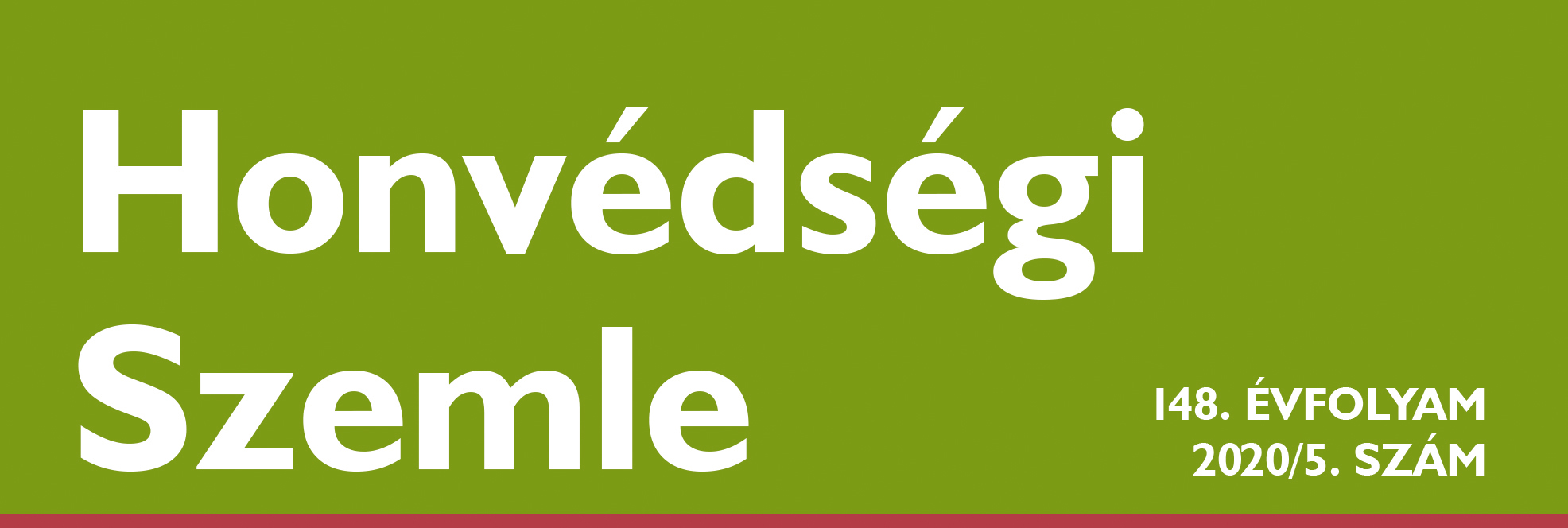A 2001. szeptember 11-ei terrortámadás hatása az Egyesült Államok nemzetbiztonsági rendszerére
DOI:
https://doi.org/10.35926/HSZ.2020.5.2Kulcsszavak:
biztonság, nemzetbiztonság, hírszerző közösség, terrorizmusAbsztrakt
A biztonság tudományos szintű vizsgálatát és intézményesítését a modern, 20. századi igények hívták életre. A második világháborút követő időszak hatalmas változásokat hozott a biztonság megítélésében. Az ipari, gazdasági, technológiai fejlődés, valamint a társadalmi átalakulások, a sokrétű és összefonódó nemzetközi kapcsolatok komplex, egymást generáló és szoros összefüggésben levő új biztonsági kihívásokat teremtettek. A 21. század kezdete fordulópontot jelentett nemcsak az Amerikai Egyesült Államok, de az egész világ biztonságpolitikájában. A biztonsági kihívások globálissá, nemzetközi eredetűvé váltak. A 2001. szeptember 11-ei terrortámadással a nemzetközi terrorizmus paradigmaváltást indított meg az Amerikai Egyesült Államok nemzetbiztonsági rendszerében.
Hivatkozások
Baumgartner, Frank R. – Jones, Bryan. D. (eds.): Policy dynamics. University of Chicago Press, Chicago, 2002.
Budinger, Zoe Baird – Smith, Jeffrey H.: Ten Years After 9/11: A Status Report On Information Sharing. Senate Committee on Homeland Security & Governmental Affairs, 12. 10. 2011. https://fas.org/irp/congress/2011_hr/101211smith.pdf
Buzan, Barry: Rethinking security after Cold War. Cooperation and Conflict, Vol. 32, No. 1, 01. 03. 1997., 5–28. https://doi.org/10.1177%2F0010836797032001001 DOI: 10.1177%2F0010836797032001001
Deák Péter (szerk.): Biztonságpolitikai kézikönyv. Osiris Kiadó, 2007.
Drew, Dennis M. – Snow, Donald M.: Making Strategy: An Introduction to National Security Processes and Problems. Air University Press, Maxwell Airforce Base, Alabama, 08. 1988. https://media.defense.gov/2017/Apr/06/2001728005/-1/-1/0/B_0023_DREW_SNOW_MAKING_STRATEGY.PDF
Eisler, Peter: Post9/11 CIA Has Shifted its Emphasis for Foreign Ops. USA Today, 17. 11. 2008. https://www.pressreader.com/usa/usa-today-international-edition/20081117/281552286702236
George, Roger Z.: Central Intelligence Agency: The President’s Own. In: George, Roger Z. – Rishikof, Harvey (eds.): The National Security Enterprise: Navigating the Labyrinth. Georgetown University Press, Washington, D.C., 2011.
Homeland Security Presidential Directive 1 (HSPD-1). 05. 11. 2001. https://www.hsdl.org/?view&did=1132 Jones, Christopher M.: Department of State Results Report. US Department of State, 09. 08. 2004. https://2009-2017.state.gov/documents/organization/35059.pdf
Kahn, David: Pearl Harbor as an intelligence failure. In: Iriye, Akira (ed.): Pearl Harbor and the coming of the Pacific War: A brief history with documents and essays. Bedford/St. Martin’s, Boston, 1999.
Kean, Thomas (ed.): The 9/11 Commission Report – Final Report of the National Commission on Terrorist Attacks Upon the United States. https://www.9-11commission.gov/report/911Report.pdf
Lederman, Gordon N.: Reorganizing the Joint Chiefs of Staff: The Goldwater-Nichols Act of 1986. Greenwood Press, Westport, CT, 1999.
Marcella, Gabriel (ed.): Affairs of the State: The Interagency and National Security. University of Michigan Libraries, 2008.
Matthews, Chris: Hardball. Free Press, New York, 1999.
May, Ernest R.: Imperial Democracy: The Emergence of America as a Great Power. Harper & Row, New York, 1977.
Mowbray, Joel: How They Did It. An ’Evil One’ Confesses, and Boasts. National Review, 2002/24.
National Strategy for Homeland Security. Office of Homeland Security, Washington, D.C., 07. 2002. https://www.dhs.gov/sites/default/files/publications/nat-strat-hls-2002.pdf
Negroponte, John D. – Wittenstein, Edward M.: Urgency, Opportunity, and Frustration: Implementing the Intelligence Reform and Terrorism Prevention Act of 2004. Yale Law and Policy Review, 2010/2., 379–417. https://digitalcommons.law.yale.edu/cgi/viewcontent.cgi?article=1596&context=ylpr
Overview of DHS Response. Homeland Security. https://www.dhs.gov/coronavirus/overview-dhsresponse
Riebling, Mark: Wedge: From Pearl Harbor to 9/11: How the Secret War between the FBI and CIA Has Endangered National Security. Simon & Schuster, New York, 2002.
Rosenwasser, Jon J. – Warner, Michael: History of the Interagency Process for Foreign Relations in the United States. In: George, Roger Z. – Rishikof, Harvey (eds.): The National Security Enterprise: Navigating the Labyrinth. Georgetown University Press, Washington, D.C., 2011, 13–31. https://books.google.hu/books?id=6tgoDwAAQBAJ&pg=PA11&hl=hu&source=gbs_toc_r&cad=3#v=onepage&q&f=false
Shiffman, Gary M. – Hoffman, Jonathan: The Department of Homeland Security: Chief of Coordination. In: George, Roger Z. – Rishikof, Harvey (eds.): The National Security Enterprise Navigating the Labyrinth. Georgetown University Press, Washington, D.C., 2011.
The National Security Strategy of the United States. The White House, 09. 2002. https://history.defense.gov/Portals/70/Documents/nss/nss2002.pdf?ver=2014-06-25-121337-027
Uniting and Strengthening America by Providing Appropriate Tools Required to Intercept and Obstruct Terror (USA Patriot Act) of 2001. 26. 10. 2001. https://www.congress.gov/107/plaws/publ56/PLAW-107publ56.pdf
US Department of State: Annual Country Reports on Terrorism. US Government Printing Office, Washington, D.C., 2001.
Vision 2015: A Globally Networked and Integrated Intelligence Enterprise. Office of the Director of National Intelligence, 2008. https://www.hsdl.org/?view&did=487577
Wright, Lawrence: The looming tower: Al-Qaeda and the road to 9/11. Alfred A. Knopf, New York, 2006.


